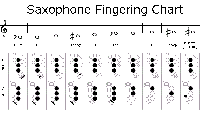David Valdez - serious resources for serious players
Pro player insights into the world of sax playing, jazz and the bigger picture. Food for your sax-o-playing souls. Recommended.
Casa Valdez
Gracias amigo.
you play saxophone? want to learn how to play it better?
you've come to the right place...
Pro player insights into the world of sax playing, jazz and the bigger picture. Food for your sax-o-playing souls. Recommended.
Part 1 of 3-part vid featuring Gerald Albright at his place, performin for Jack & Jill Society members. Plays 'Bluesette', 'So Amazing' and in later parts, 'Georgia on my mind'.
Part 1 of an 8-part (at times) gallic 'yawn-fest' compounded by amateur video technique, featuring Dave Sanborn and his peculiarities re reeds. Part 2 on he actually plays. Accompanied by Gil Goldstein (pn), who according to the subbie, looks only slightly more animated than the ceiling tiles featured in this clip.
If you're new to playing sax, the Blues is an ideal place to start. But first...
TGO is all about the best stuff available online, so it stands to reason that the following online ear training sites must be included. Check these out - they're brilliant (and free):



It's difficult to find impartial information about saxophone mouthpieces and reeds without having to wade through alot of ads for why you should buy this mouthpiece or these reeds etc. BUT amongst the ads, there's the good oil...
Check these sites for free transcriptions of famous saxophonists.
There is some useful stuff about available free for saxophone players.
Music theory is an important tool for understanding patterns and symbols used to express musical ideas. There are several really good sites that cover alot.
Here are some great ideas for creating your own personalized practice routines. The examples from these sites may not be right for you as written, but the topics included give you good ideas as to what you should try and include.
There are many sites out there with scale / chord and pattern exercises for you to print out. Here are some of the best.
One of the best sources of information for saxophonists is from several of the 'saxophone forums' that exist on the Web. You can ask any questions you have about the instrument and they are categorized so that searching the archives of previous posts is made easier. You'll need to register to post to them.
For me, the sound of the saxophone is the most exciting part of playing the sax. Apparently it shares similarities with the voice, in the way that it is produced and the range of tonal qualities that you can get (eg bright, mellow, edgy). It makes sense to work on this aspect of saxophone playing and there's good advice on the Web to help.
If you're just starting out on saxophone then there are several things to learn up on first, including the notes (what you do with your fingers), developing a stable embouchure, building breath capacity and control, plus what makes a good tone on saxophone. Get a saxophone teacher if you want to progress faster than teaching yourself. Also, s/he can help you avoid forming 'bad habits' that can take a long time to correct later.